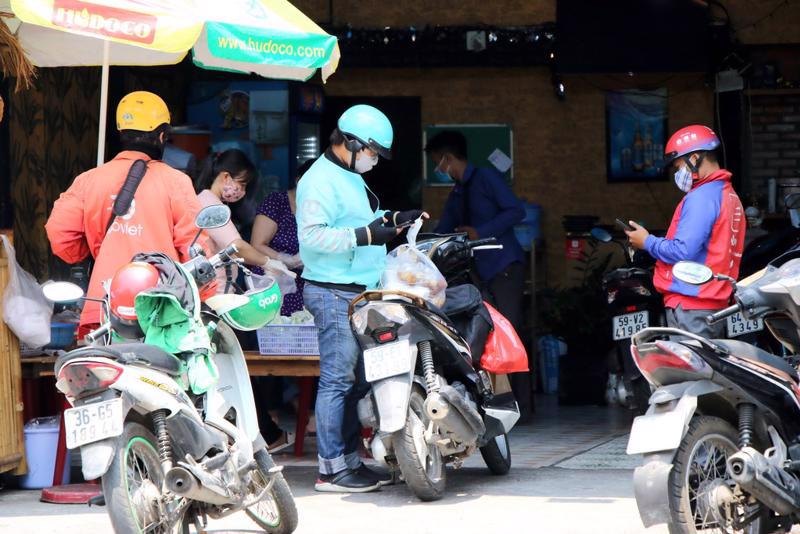Mr. Peter Christou, General Manager, Worldpanel Division, Kantar Vietnam
Vietnam’s online food delivery market boasts immense potential, fueled by a young, tech-savvy population and rising disposable incomes, especially in urban areas.
The market benefits from an expanding class of next-generation consumers who readily embrace new technologies and online platforms, creating fertile ground for innovative app development and personalized experiences.
Since Covid-19 restrictions eased at the end of 2021, households have been allocating a larger share of their wallet to eating and drinking. The increasing spending power of Vietnamese consumers fuels the appetite for convenient and premium food delivery services, opening the door for value-added offerings. Kantar’s survey of shoppers in Urban 4 key cities (Hanoi, Ho Chi Minh City, Da Nang, and Can Tho) showed that one out of three households get takeaway meals at least once a week. A confluence of these factors translates into a massive and rapidly-growing customer base, presenting vast opportunities for new players and scaling existing businesses.
However, the hyper-competitive nature of Vietnam’s online food delivery market presents a strategic challenge for new and established players alike. In particular, new entrants will face intense competition from established players like Grab and ShopeeFood, who dominate the market with vast resources and unrelenting strategies. New players need to be agile, innovative, and laser-focused on their value proposition to differentiate themselves.
The fierce competition, characterized by extreme discounting, has created a challenging environment. It has led some to perceive the market as “unfertile”, but I believe it is more accurate to say it is a market where brand loyalty is fluid and price sensitivity reigns supreme. Players need to focus on offering the best deal at any given moment, while simultaneously building a unique value proposition that goes beyond just discounts.
While promotions can attract initial customers, relying solely on discounts is unsustainable and can have a detrimental impact on profitability and long-term growth. Brands need to understand the incremental impact promotions have on them and on the categories they play in. To achieve sustainable success in this dynamic environment, a strategic imperative lies in moving beyond the price / promotion fixation and implementing a multi-pronged approach, including a robust and efficient logistics network, frictionless ordering and payment UI / UX (user interface / user experience) for a smooth experience that keeps customers coming back, and strategic partnerships with diverse and localized vendor partner selection.
Vietnamese consumers are highly price-conscious and have little loyalty to a particular brand, but service providers relying solely on discounts is unsustainable. In a market where customers readily switch between platforms for discounts, building trust and brand affinity is an ongoing battle. Consistent quality, a seamless platform experience, reliable service, and positive customer interactions are key to creating loyal supporters.
In general, Vietnam’s online food delivery market is a complex and dynamic landscape filled with challenges and opportunities. While Baemin’s departure serves as a cautionary tale, it also highlights the potential for players who can adapt, innovate, and offer a differentiated value proposition.
Mr. Kengo Kurokawa, Founder and CEO, Asia Plus Inc.
In a competitive market, online food delivery apps have advantages to grow from their diverse services. For example, a major strength for Shopee lies in its powerful branding and extensive user touchpoints fostered through e-commerce services. Additionally, ShopeeFood benefits from integrated mobile payment services. So, the opportunity lies in the potential to build a robust ecosystem through other apps, opening avenues for growth. However, challenges loom, as Grab, a key competitor, targets user touchpoints and fintech services. This rivalry may fuel a price-oriented war, demanding substantial investments.
Vietnamese consumers prioritize price, and service providers acknowledge that competitive pricing and promotions are crucial to winning and retaining market share. This approach has led to a scenario where consumers have become accustomed to attractive offers, so that price / promotions remain the core reason for vendor selection. In Vietnam, a robust business model is vital for profitability, but the prevalence of price-oriented consumers makes devising such strategies challenging. Striking a balance between offering competitive prices and maintaining a sustainable business model is a complex task in a market where consumers expect sweet deals.
Offering deals and good prices is crucial, as many Vietnamese are deal hunters. Thus, service providers need to think about how to make a profit. The most common approach, seen globally, is expanding to a super-app, to utilize touchpoints to provide more services and then more profits. Another is profit-generating activities utilizing their vast data, such as cloud kitchens. Balancing these strategies helps companies do well in Vietnam’s competitive online food scene.
Mr. Sumit Rathor, General Manager, Gojek in Vietnam
Vietnam’s digital economy continues to be positive and holds great potential, with average growth of 16-30 per cent seen over the past few years, according to data from the Ministry of Industry and Trade (MoIT). In a dynamic landscape of evolving industries and demanding markets, tech companies, including Gojek, must relentlessly enhance their comprehension of consumer behavior and innovate swiftly to stay ahead. This will allow us to build a strong ecosystem and ensure that we can grow in a sustainable and profitable way, which in turn supports the growth of our entire ecosystem, including merchants, driver partners, and customers.
Against the backdrop of a challenging macro-economic situation and consumers tightening their spending in recent years, a significant number of users have become more price-sensitive. The challenge for us is in ensuring our services can still cater to the needs of these users. However, rather than entering a price race, which could devalue our services, negatively impact the income of our partners, and ultimately lower the customer experience, we believe there are better ways to provide a better user experience, specifically through technology and customer insights.
At Gojek, we have been striving to make our services more accessible to consumers and creating products that lower structural costs and appeal to budget consumers. We are continuing to focus on leveraging our cutting-edge technology to provide greater convenience for our users, while supporting our merchants and driver partners. Creating a social impact has been part of Gojek’s DNA since Day 1. On the technology front, Gojek uses the insights gained from data and technology to better meet the needs of our ecosystem.
According to MoIT data, Vietnam’s e-commerce market is expected to have reached $20.5 billion by the end of 2023. Transportation, online food delivery, and logistics still meet the daily needs of people in the country. Vietnam also has a young, tech-savvy population and a high percentage of people using the internet and smartphones. This means that its digital economy holds great growth potential, especially in online food delivery, with significant room for further development.
However, we also recognize that the competitive landscape has been intensifying and this means we need to be more focused with more initiatives that will maintain our momentum and support our ecosystem’s sustainable growth in the long run. Our focus will be on making our services more convenient and accessible and creating products that appeal to all types of users, including budget consumers.
GrabFood Representative
2023 has been a rigorous time for food delivery. To remain robust amid a challenging economic climate, Grab has to identify what our advantages are and how to leverage them as practically as possible.
As our latest Food and Grocery Delivery Trends Report 2023 suggests, deliveries were the way to go during the pandemic, and because of the convenience and affordable options it brought to consumers, it has continued to grow to become a part of their everyday repertoire.
It is critical for us to continue to leverage our strengths in market insights and tech solutions. Even more importantly, we have to seriously take into account the needs of our merchant partners, the majority of which are small businesses, and support them to grow in a sustainable manner.
While Vietnamese consumers are ordering more than before, the way they use delivery platforms to order food and groceries in the post-pandemic era has been shifting. For instance, according to our Food and Grocery Delivery Trends Report 2023, Vietnamese users are increasingly relying on the GrabFood platform for more than just deliveries. Delivery apps are now the No. 1 way Vietnamese consumers are discovering new restaurants and stores, ahead of food blogs, friends and family, and social media platforms.
This may present growth opportunities for platforms that are able to capture this transformation. Conversely, those that are not dynamic enough in such a change may find themselves struggling.
ShopeeFood Representative
ShopeeFood has recorded significant growth in the online food delivery market over recent years thanks to the benefits the service brings to users: convenience and seamless experience, diversity in choice, and attractive promotions.
Not only is consumer demand increasing, food and beverage (F&B) businesses are also growing to keep pace with the digital transformation process. As we have noted, more and more F&B businesses are participating in selling on ShopeeFood in order to reach online users and boost sales performance.
We are positive about the development potential of Vietnam’s online food delivery market.









 Google translate
Google translate